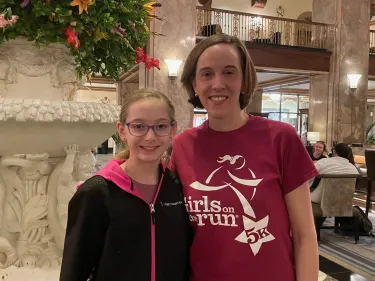 |
| Jill Benson |
“Why do we have children’s ministry available at our church? It’s important to start with the why,” Benson said to workshop attendees meeting in person at the Peabody Hotel in Memphis, Tennessee, and online. “For me, I love children, and I learn from them.” Alongside that is the privilege “to see them grow in their faith and form a lifelong faith.”
While Benson took workshop attendees back 85 years to survey the history of children’s ministry, “it goes all the way back to Deuteronomy and the Shema,” she said. For this portion of the presentation, Benson drew from Scottie May et al, the authors of “Children Matter: Celebrating Their Place in the Church, Family and Community.”
The years 1940–1965 saw content-centered children’s ministry, when “ministry was done to children to encourage this process of faith formation,” she said. Children were seen as sponges, and the teacher was “the expert, the boss, the funnel holder and the evaluator.” The traditional Sunday school setting dominated.
The strength during that era was the promotion of biblical literacy. “You could rest assured you were an emerging disciple of Christ,” Benson said. “But biblical literacy didn’t turn into lifelong faith formation.”
From 1965–1990, children’s ministry was student-centered. The goal was to make sure children enjoyed Sunday school, and programming “became elaborate,” Benson said. The teacher was seen as “the coordinator, customer service representative, ringmaster and planner,” Benson noted.
Processed-centered children’s ministry has dominated since 1990. The goal is to help the child to encounter God and God’s story in ways that form faith. The emphasis is on the relationship between the child and the adult and the process by which learning takes place. Children can be seen as a plant, a sheep, a pilgrim or a scientist “who learn and investigate together to find truth,” Benson said. The teacher is seen as a shepherd, farmer, fellow pilgrim or co-learner.
The strength of this model is “the emphasis on more authentic engagement with the biblical story,” while a weakness is “we focus on the quiet, contemplative moments and don’t include enough fun activities,” she said.
“This history does not mean that earlier views were wrong or bad,” but “they were less effective than once thought,” Benson said. “As we learned more about children, we altered the way we did children’s ministry.”
It could be a new era of children’s ministry has begun — one in which educators and other grownups are spiritually formed by children.
According to Benson, May says there have been “many times” she’s been ministered to by children, “but it has usually happened unintentionally. What if we made it intentional?”
Benson asked workshop attendees to break into small groups to discuss questions including, “Are you comfortable with what children’s ministry looks like at your church, or are there aspects of another model that you would like to include?”
“We noticed that the ‘entertainment model’ is often associated with the large numbers and ‘glory days’ of our churches,” said one workshop participant. “But we appreciate now functioning with the ‘with/by’ models, often with fewer numbers.”
Through Visio Divina, Benson then used “The Book of Belonging” and art by A Sanctified Art to tell the story of The Daughters of Zelophehad, reading the story as she might to a child.
Then she asked those in the workshop: Anything you wonder about this story?
Benson called wondering questions “a fantastic way to engage children. They don’t have a specific answer, or a right answer. The point is to help children put themselves in the story.”
Among her favorites is the one she had just asked: What do you wonder about this story?
“Kids jump right in and answer that one,” Benson said.
A link to a 10-question tool for choosing curriculum is here. Lists of five ways to help families grow in faith, help kids to worship and to pray with kids, can be found here.
Mike Ferguson, Editor, Presbyterian News Service (Click here to read original PNS story)
Let us join in prayer for:
- Alonzo Johnson, Coordinator, Self-Development of People, Interim Unified Agency
- Carlton Johnson, Director, Racial Equity & Women’s Intercultural Ministries, Interim Unified Agency
Let us pray:
Gracious God, we give thanks that you multiply our small and humble offerings and efforts as we work to care for those in need. We ask that you sharpen our focus on you and on ways we may serve. Amen.









